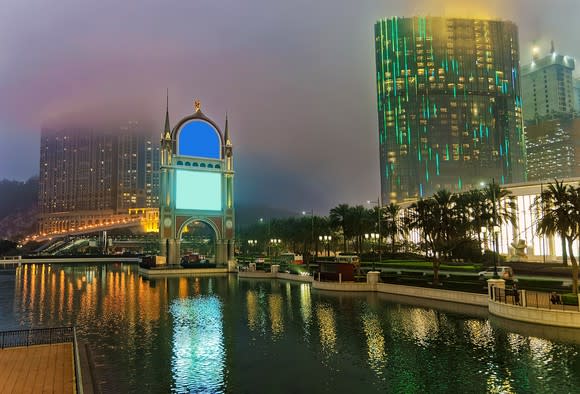Wynn Resorts Has a Tourist Problem
Las Vegas Sands (NYSE: LVS) might generate the most total revenue from Macau, but Wynn Resorts (NASDAQ: WYNN) realizes almost three-quarters of its profits from the Chinese gaming enclave, and recent indicators suggest the region is heading for a more severe slowdown than previously believed.
Though gaming revenue rebounded above expectations in November, Barron's reports that UBS analyst Robin Farley has dramatically revised her forecast downward. Her prior outlook for Macau gross gambling revenue (GGR) was for 5% growth in 2019, but she now believes GGR will fall by 1% next year, and that revenues in 2020 will only grow by 4% -- half the rate she originally estimated for that year. Essentially, Macau is attracting more tourists and fewer gamblers, and the results are starting to show up in the casinos' earnings reports.

Image source: Getty Images.
The chips are down
After rising in 2017, gaming revenue growth softened considerably this year, particularly in September and October due to a typhoon that closed all the casinos for a weekend; results from China's Golden Week holiday were also weak.

Data source: Macau Gaming Inspection & Coordination Bureau. Chart by author.
Although November's strength surprised analysts -- gaming revenues rose 8.5% for the month -- Farley still sees a hard slowdown coming because VIP gambler visits are slipping, and China faces broad macroeconomic concerns.
VIP baccarat revenues are a proxy for high roller traffic in Macau, and while gross gaming revenue is up 13.7% in 2018 to 276.4 billion patacas (about $34.35 billion) -- the highest it's been in four years, actually -- VIP baccarat continues to decline. VIP baccarat receipts hit 40 billion patacas (about $5 billion) in the third quarter, lower than the 41 billion patacas reached in the second quarter, which itself was down from nearly 43 billion patacas in the first quarter.
Farley notes that plenty of people are still going to Macau, but they're not spending as much on average as they once were, and she forecasts spending will decline further because the territory is drawing a more tourist-heavy crowd.
A tourist trap
Of course, this is what Beijing has been pushing. When the government agreed to allow gambling to expand into the Cotai district, it required casino operators to introduce entertainment options that would attract more non-gambling spending. So Las Vegas Sands Parisian resort includes a half-scale Eiffel Tower, while Studio City International (NYSE: MSC) features a giant figure-eight Ferris wheel and a Batman-themed 4-D flight simulator ride. For its part, Wynn Resorts opted for luxury retail outlets and a gondola ride with views of the city.
The Chinese government wants Cotai to be more like Las Vegas, and it's set a target of 9% non-gaming revenue for the casinos by 2020. Casinos have achieved that threshold five years early, but for comparison, Las Vegas casinos derive about two-thirds of their revenue from non-gaming activities.
The high rollers can be a mixed blessing for casinos: Though they spend more than tourists, it also costs more to lure them in. Doing so requires casinos to partner with junket operators who ply VIP gamblers with amenities and loan them money to gamble with. In return, the casinos must pay the junket operators a percentage of what they win from the high rollers the operators bring.
Watch out for Wynn
If Farley turns out to be correct in her forecast, and if VIP gamblers make themselves more scarce in the next couple of years, that will heavily impact Wynn Resorts, because its operations are more reliant on wealthier gamblers.
There's a lot of uncertainty facing Macau beyond tourist flow and macroeconomic concerns in China. Japan, for example, will soon pick the three cities it will allow to host its new legalized casinos; once these resorts open, they may prove more attractive to VIPs than Macau's venues, particularly if Beijing continues cracking down on money flows out of mainland China to the territory.
Given its problems abroad as well as weakness at home, Wynn Resorts isn't looking like a good bet these days.
More From The Motley Fool
Rich Duprey has no position in any of the stocks mentioned. The Motley Fool has no position in any of the stocks mentioned. The Motley Fool has a disclosure policy.
